-
New method helps identify chemical warfare agents
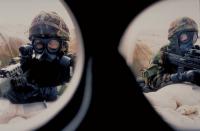
Chemical warfare agents are powerful noxious chemicals that have been used as weapons of mass destruction. Finding trace amounts of a chemical warfare agent in a sample can be challenging, especially if the agent and the liquid it is in are both water-repellant, which is often the case. A new method for extracting, enriching, and identifying chemical warfare agents from oils and other organic liquids could help government officials and homeland security protect civilians more effectively from their deadly effects. The method uses nanoparticles to capture the chemicals.
-
-
Electronic nose detects pesticides, nerve gas
Detecting pesticides and nerve gas in very low concentrations? An international team of researchers has made it possible. The researchers have built a very sensitive electronic nose with metal-organic frameworks (MOFs). The chemical sensor can easily be integrated into existing electronic devices.
-
-
New proposal seeks to focus on the fix for lead poisoning
The crisis of lead-contaminated drinking water in Flint, Michigan, continues to make headlines — but it is just the most prominent example of an “ongoing and needless tragedy of childhood lead poisoning,” says a leading expert on childhood lead poisoning prevention. The “debacle” in Flint should spur urgently needed but long-delayed action to address the continuing crisis of lead poisoning in the United States and around the world.
-
-
France to employ anti-drone technology to protect Euro 2016 soccer games
France will employ anti-drone technology to interfere with and take control of any flying machines breaching strict no-fly zones over stadiums where the games of the 2016 European Soccer Championship will be played. The technology is part of broad and unprecedented security measures taken to secure Europe’s biggest sports event. French security agencies have been training for some time for the possibility of drones used to disperse chemical agents over crowds.
-
-
Assad's forces use sarin gas for first time since 2013 killing of 1,400 civilians
The Assad regime has used sarin gas for the first time since 2013, dropping a sarin-filled bombs on ISIS fighters outside Damascus, a senior Israeli official has said. On 21 August 2013 the Syrian military used sarin and VX to kill 1,400 Sunni civilians in a rebel-held suburb of Damascus. In the wake of the attack, Russia and the United States pressured Assad to give up his chemical weapons arsenal and dismantle Syria’s chemical weapons manufacturing capabilities. Western intelligence services say that Assad likely disposed of his mustard and VX, in accordance with the deal, but that he chose to keep the sarin, the most lethal agent at his disposal.
-
-
ISIS manufacturing chemical weapons: UN watchdog
A team of investigators at the Organization for the Prohibition of Chemical Weapons (OPCW) said that there is “worrying” evidence ISIS is making its own chemical weapons. An OPCW team of investigators said they had found evidence of the use of homemade sulphur mustard in attacks in Syria and Iraq.
-
-
New drug to combat the effects of nerve agents
Sarin is a colorless, odorless liquid fatal even at very low concentrations. Serious sarin poisoning causes visual disturbance, vomiting, breathing difficulties and, finally, death. A ground-breaking study describes the development of a new drug which counteracts the effects of sarin gas.
-
-
Groundwater quality changes alongside the expansion of hydraulic fracturing and horizontal drilling
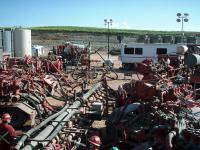
New research demonstrates that groundwater quality changes alongside the expansion of horizontal drilling and hydraulic fracturing but also suggests that some potentially hazardous effects may dissipate over time. The research is the first to analyze groundwater quality in the Cline Shale region of West Texas before, during, and after the expansion of hydraulic fracturing and horizontal drilling.
-
-
1,500 people killed in 160 documented chemical attacks in Syria since 2011
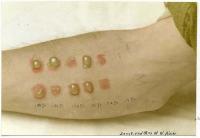
The Syrian American Medical Society (SAMS) earlier today (Monday) released a report detailing 161 chemical attacks in Syria since the conflict emerged in 2011. These attacks have killed nearly 1,500 people in Syria, according to the report. A UN war crimes expert says the documentation of the attacks will allow for international prosecution in the future.
-
-
ISIS attacks Iraqi town with chemical weapons

Iraqi officials has said that ISIS has launched two chemical attacks near the city of Kirkuk in northern Iraq, killing a three-year-old girl and wounding up to 600 people. The chemical attacks took place early Saturday in the town of Taza, security and hospital officials said place early on Saturday in the small town of Taza. The town was struck by several rockets carrying the chemicals.
-
-
U.S. captures head of ISIS chem weapons unit; targets ISIS chem weapons infrastructure

U.S. Special Forces operating in Iraq captured the head ISIS chemical weapons unit. Sleiman Daud al-Afari, who worked for Saddam Hussenin’s now-disbanded Military Industrialization Authority where he specialized in chemical and biological weapons, was captured during a raid near the northern Iraqi town of Tal Afar last month.American and Iraqi officials say that there are many indications that ISIS is working hard to develop chemical weapons.
-
-
ISIS used mustard gas in Iraq: UN watchdog
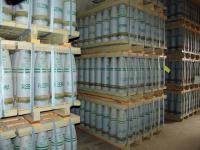
A source at the UN chemical weapons watchdog, the Organization for the Prohibition of Chemical Weapons (OPCW), said that in 2015 ISIS attacked Kurdish forces in Iraq with mustard gas. It was the first documented use of chemical weapons in the country since Saddam Hussein used chemical weapons against Kurdish civilians in 1998.
-
-
Toxins found in fracking fluids and wastewater: Study

In an analysis of more than 1,000 chemicals in fluids used in and created by hydraulic fracturing (fracking), researchers found that many of the substances have been linked to reproductive and developmental health problems, and the majority had undetermined toxicity due to insufficient information. The researchers say that further exposure and epidemiological studies are urgently needed to evaluate potential threats to human health from chemicals found in fracking fluids and wastewater created by fracking.
-
-
Gov. Brown declares emergency in wake of massive L.A. natural gas leak
California governor Jerry Brown on Wednesday declared an emergency in a Los Angeles neighborhood where a natural gas well has been spewing record amounts of stinking, global-warming methane gas. Energy experts said the breach at the natural gas storage reservoir, and the subsequent, ongoing release, are the largest known occurrence of its kind.
-
-
Transforming deadly chemicals into harmless dirt
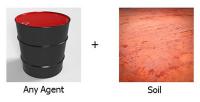
Destroying bulk stores of chemical warfare agents is a challenge for the U.S. and international community. Current methods of eradication, such as incineration or hydrolysis, are not fully agnostic, require significant amounts of water and create hazardous waste that requires further processing. DARPA’s Agnostic Compact Demilitarization of Chemical Agents (ACDC) program recently awarded two contracts to develop prototypes of a transportable disposal system able to convert dangerous chemicals into safe output, such as harmless soil, using minimal consumables and creating no hazardous waste.
-
- All
- Regional
- Water
- Biometrics
- Borders/Immig
- Business
- Cybersecurity
- Detection
- Disasters
- Government
- Infrastructure
- International
- Public health
- Public Safety
- Communication interoperabillity
- Emergency services
- Emergency medical services
- Fire
- First response
- IEDs
- Law Enforcement
- Law Enforcement Technology
- Military technology
- Nonlethal weapons
- Nuclear weapons
- Personal protection equipment
- Police
- Notification /alert systems
- Situational awareness
- Weapons systems
- Sci-Tech
- Sector Reports
- Surveillance
- Transportation
Advertising & Marketing: advertise@newswirepubs.com
Editorial: editor@newswirepubs.com
General: info@newswirepubs.com
2010-2011 © News Wire Publications, LLC News Wire Publications, LLC
220 Old Country Road | Suite 200 | Mineola | New York | 11501
Permissions and Policies
Editorial: editor@newswirepubs.com
General: info@newswirepubs.com
2010-2011 © News Wire Publications, LLC News Wire Publications, LLC
220 Old Country Road | Suite 200 | Mineola | New York | 11501
Permissions and Policies
